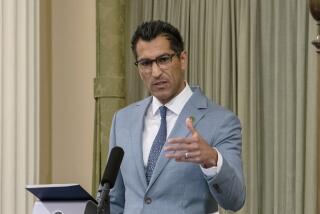Panel Considers Delay, Shift to Tax Increase : Reform Panel May Consider Tax Increase
- Share via
WASHINGTON — House Democratic leaders raised the possibility today of delaying tax-reform efforts until next month to see if the bill should be made into a tax increase to help cut the deficit.
With conference committee efforts to reach a compromise tax reform bill at a crucial stage, Speaker Thomas P. (Tip) O’Neill Jr. (D-Mass.) said delaying action on a final tax reform bill would give Congress time to review new economic estimates due late this month and determine if a tax hike is needed to help balance the budget.
However, O’Neill said that while he would support a tax increase, he still would insist that President Reagan lead the way and ask for the hike.
‘Revenue-Neutral’ Request
Reagan, who has adamantly opposed any tax increase, has demanded that a tax reform bill be “revenue-neutral”--not significantly raising or lowering the amount of money the government collects. He has said he will veto any tax-reform bill that is also a tax increase.
But O’Neill noted that “a lot of us would like to” hold off action on tax reform to examine the deficit problem next month.
He said if the deficit is shown to be $8 billion or $10 billion over the limits required by the Gramm-Rudman balanced budget law, “instead of having an equalized tax bill, you might put $8 (billion) or $10 billion in it to get by the first year.”
Stalemate Threatened
Meanwhile, the chief Senate tax negotiator said a dispute over requiring the Internal Revenue Service to shift its priorities threatens to stalemate tax-overhaul efforts.
“We at the moment appear to be at loggerheads,” Sen. Bob Packwood (R-Ore.) told reporters after a morning of Senate and House bargaining failed to resolve the IRS issue.
Other lawmakers indicated that the quarrel could make it impossible for the conference committee to complete work on the tax measure before recessing at the week’s end.
The dispute grows out of a Senate provision that seeks to boost revenue collections by requiring the IRS to earmark more of its budget for auditing returns and collecting past-due accounts. The Senate is counting on that provision to raise $17.6 billion over the next five years--money needed to pay for other parts of the tax plan.
House negotiators are not opposed to requiring more audits and greater collection efforts but fear that taking money away from IRS taxpayer services--such as answering telephoned questions and providing free publications--could be counterproductive.
More to Read
Get the L.A. Times Politics newsletter
Deeply reported insights into legislation, politics and policy from Sacramento, Washington and beyond. In your inbox twice per week.
You may occasionally receive promotional content from the Los Angeles Times.










